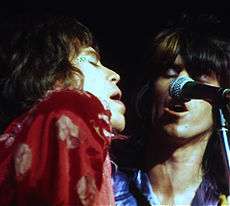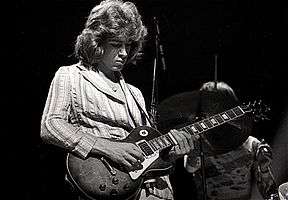The Rolling Stones American Tour 1972
| Tour by The Rolling Stones | |
 | |
| Associated album | Exile on Main St. |
|---|---|
| Start date | 3 June 1972 |
| End date | 26 July 1972 |
| Legs | 1 |
| No. of shows | 48 |
| The Rolling Stones concert chronology | |
The Rolling Stones American Tour 1972 was a much-publicized and much-written-about concert tour of the United States and Canada in June and July 1972 by The Rolling Stones. Rock critic Dave Marsh would later write that the tour was "part of rock and roll legend" and one of the "benchmarks of an era."[1] Stevie Wonder was the support act for the tour, having released his groundbreaking Music of My Mind album March 3 that year.
The tour and difficulties

The tour followed the release of the group's album Exile on Main St. a few weeks earlier on 12 May.
On the first show of the tour, 3 June in Vancouver, British Columbia, 31 policemen were treated for injuries when more than 2,000 fans attempted to crash the Pacific Coliseum.[2] In San Diego on 13 June there were 60 arrests and 15 injured during disturbances. In Tucson, Arizona on 14 June, an attempt by 300 youths to storm the gates led to police using tear gas.[3] Eighty-one people were arrested at the sellout Houston shows, mostly for marijuana possession and other drug offences.[4] There were 61 arrests in the large crowd at RFK Stadium in Washington, D.C. on the Fourth of July.[5] On 13 July police had to block 2,000 ticket-less fans from trying to gain access to the show in Detroit.[6] On 17 July at the Montreal Forum a bomb blew up in the Stones' equipment van, and replacement gear had to be flown in; then it was discovered that 3,000 forged tickets had been sold, causing a fan riot and a late start to the concert.[2] The next day, 18 July, the Stones' entourage got into a fight with photographer Andy Dickerman in Rhode Island, and Jagger and Richards landed in jail, imperilling that night's show at the Boston Garden. Boston Mayor Kevin White, fearful of a riot if the show were cancelled, intervened to bail them out; the show went on, albeit with another late start. Dickerman would later file a £22,230 lawsuit against the band.[7] The tour ended with three consecutive nights at New York City's Madison Square Garden, the first night of which saw 10 arrests and two policemen injured,[8] and the last leading to confrontations between the crowd outside Madison Square Garden and the police.[9]
While in Chicago, the group stayed in Hugh Hefner's Playboy Mansion.[10] The last show on 26 July, Jagger's birthday, had balloons and confetti falling from Madison Square Garden's ceiling and Jagger blowing the candles off a huge cake. Pies were also wheeled in, leading to a pie fight between the Rolling Stones and the audience.[9] Afterwards a party was held in Jagger's honor by Ahmet Ertegun, that included Bob Dylan, Woody Allen, Andy Warhol, the Capote entourage, and Zsa Zsa Gabor, with music from Count Basie. Dylan referred to the event as "the beginning of an all-encompassing consciousness".
Rock critic Robert Christgau reported that the mood of the shows was friendly, with Jagger "undercut[ting] his fabled demonism by playing the clown, the village idiot, the marionette."[11]
Stevie Wonder was the support act for the tour, becoming known to rock audiences just before the release of Talking Book.[12]
Coverage

Several writers were assigned to cover the tour. Truman Capote was commissioned to cover the tour for Rolling Stone. Accompanied by prominent New York socialites Lee Radziwill and Peter Beard, Capote did not mesh well with the group; he and his entourage abandoned the tour in New Orleans, only to resurface for the final shows at Madison Square Garden. He did not complete his feature, tentatively entitled "It Will Soon Be Here". Rolling Stone ultimately recouped its stake by assigning Andy Warhol to interview Capote about the tour in 1973. Novelist and screenwriter Terry Southern, a close friend of Keith Richards, covered the tour for Saturday Review. Robert Greenfield's S.T.P.: A Journey Through America With The Rolling Stones was published in 1974. Greenfield had already covered the band's 1971 British Tour for Rolling Stone and was granted unlimited access to the band's affairs. Greenfield was initially assigned as the magazine's sole correspondent on the tour, but then was reassigned to "additional reporting" status by publisher Jann Wenner after a last-minute deal was reached with Capote.
Dick Cavett hosted a one-hour special shot before the concluding New York engagement of performances. Capote appeared on The Tonight Show Starring Johnny Carson and several other talk shows, talking about his experiences on the tour. New York radio host Alex Bennett reported on the first Madison Square Garden show as soon as he got back from it.
Filming
No live album was released from the tour, although one was planned as far as having a front and back cover designed and studio touch-ups being made on several recorded tracks. Eventually, the album was shelved due to contractual disputes with Allen Klein.
Two films of the tour were produced. The concert film Ladies and Gentlemen: The Rolling Stones! only saw a limited theatrical release in 1974. Aside from an Australian VHS release in the early 1980s, it wasn't officially available on home video until 2010.
Robert Frank's Cocksucker Blues is an unreleased documentary shot in cinéma vérité style; several cameras were available for anyone in the entourage to pick up and start shooting backstage parties, drug use,[13] and roadie and groupie antics,[14] including a groupie in a hotel room injecting heroin.[15] The film came under a court order which forbade it from being shown other than in very restricted circumstances. The film has since surfaced online in various bootlegged versions of varying quality.[13][16]
The Rolling Stones
Additional musicians
|
Tour support acts
Opening for the tour's shows was Stevie Wonder; this placement, along with his hard-edged hit of the time "Superstition" (released October 1972), did much to increase Wonder's visibility to rock audiences, at this the beginning of his classic period. Wonder would also sometimes join the Stones at the end of a night's performance.
Tour set list

The standard set list for the tour was:
- "Brown Sugar"
- "Bitch"
- "Rocks Off"
- "Gimme Shelter"
- "Happy"
- "Tumbling Dice"
- "Love in Vain"
- "Sweet Virginia"
- "You Can't Always Get What You Want"
- "All Down the Line"
- "Midnight Rambler"
- "Bye Bye Johnny"
- "Rip This Joint"
- "Jumpin' Jack Flash"
- "Street Fighting Man"
- Encore: often none, sometimes "Honky Tonk Women", a few times "Uptight (Everything's Alright)" / "(I Can't Get No) Satisfaction" medley performed jointly by the Stones and Stevie Wonder and his band
Additional songs performed:
- "Loving Cup" (Vancouver, 3 June; both shows in Seattle, 4 June; Winterland in San Francisco, 8 June, second show)
- "Ventilator Blues" (only on opening night in Vancouver, 3 June)
- "Torn and Frayed" (only on opening night in Vancouver, 3 June)
- "Dead Flowers" (only in Fort Worth, 24 June, first show)
- "Sweet Black Angel" (only in Fort Worth, 24 June, first show)
- "Don't Lie to Me" (only in Fort Forth, 24 June, second show)
The exact number of setlist variations are subject to ongoing research. Notably absent was anything from before 1968 in the Stones' catalog (excepting in the occasional encore medley). This tour also marked the banishment of their dark epic "Sympathy for the Devil", which had been wrongly associated with the killing at Altamont, from Stones' American performances for much of the 1970s.
The tour grossed a then-record of $4 million (US$22,666,667 in 2016 dollars[17]).[18]
Tour dates
References
- Greenfield, Robert. S.T.P.: A Journey Through America With The Rolling Stones. Reissued De Capo Press, 2002. ISBN 0-306-81199-5
- Carr, Roy. The Rolling Stones: An Illustrated Record. Harmony Books, 1976. ISBN 0-517-52641-7
- ↑ Marsh, Dave (1987). Glory Days: Bruce Springsteen in the 1980s. Pantheon Books. ISBN 0-394-54668-7. p. 15.
- 1 2 "Rolling through scandal". The Vancouver Sun. 2008-04-02. Retrieved 2013-12-02.
- ↑ 50 Greatest Concerts in San Diego History 1917–2005
- ↑ By popular demand: The 1972 Rolling Stones concert
- ↑ Goodbye, RFK
- ↑ Rolling Stones Bring Havoc to Cobo
- ↑ Stones Tour: All Ends Well Despite Bust, Bomb, Rolling Stone
- ↑ Memorable Performances From Madison Square Garden
- 1 2 Birthday Battle Ends Stones Tour, Vancouver Sun
- ↑ The Rolling Stones Go South
- ↑ Robert Christgau, "The Rolling Stones", entry in The Rolling Stone History of Rock & Roll, Random House, 1980. p. 200.
- ↑ "The 10 Best Opening Acts in Rock History – 9. The Rolling Stones/Stevie Wonder (1972)". Rolling Stone.
- 1 2 "The Trouble With 'Cocksucker Blues'". Rolling Stone Magazine. 3 November 1977. Retrieved 2 June 2012.
- ↑ Fricke, David (20 November 2012). "The Greatest Rolling Stones Movie You've Never Seen: 'Cocksucker Blues'". Rolling Stone Magazine. Retrieved 2 June 2012.
- ↑ Doyle, Patrick (26 October 2009). "Rolling Stones' Controversial Tour Documentary "Cocksucker Blues" Screens in New York". Rolling Stone Magazine. Retrieved 2 June 2013.
- ↑ IMDb
- ↑ Federal Reserve Bank of Minneapolis Community Development Project. "Consumer Price Index (estimate) 1800–". Federal Reserve Bank of Minneapolis. Retrieved October 21, 2016.
- ↑ Wyman, Bill (2002). Rolling With the Stones. Dorling Kindersley. ISBN 0-7513-4646-2.p. 398.